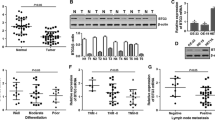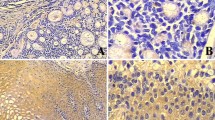Abstract
To determine the expression and function of B cell translocation gene 1 (BTG1) in esophageal carcinoma, esophageal samples were taken from cancer lesions (n = 74) and adjacent normal tissue (n = 34) in esophageal cancer patients immediately after endoscopic biopsy. BTG1 expression was determined by immunohistochemistry and Western blotting. The effect of BTG1 overexpression was examined in vitro utilizing a human esophageal cancer cell line ECA-109 stably transfected with a recombinant lentivirus (LeBTG1 cells) and compared to empty vector-transfected controls (LeEmpty). BTG1 overexpression was verified by real-time reverse transcriptase polymerase chain reaction (RT-PCR) and Western blot. The expression of proteins involved in cell cycle regulation (cyclin D1) and apoptosis (Bcl-2) and cell migration (MMP-9) in LeBTG1 cells was analyzed by Western blot. The effect of BTG1 overexpression on cell viability and proliferation was assessed by an MTT assay in LeBTG1 and LeEmpty cells. Flow cytometric analyses were used to evaluate the effect of BTG1 expression on cell cycle distribution and apoptosis. The migration and invasion potential of LeBTG1 cells was examined by plating cells in Matrigel-coated chambers. The level of BTG1 protein expression was found to be significantly lower in esophageal cancer tissue than normal tissues (P < 0.05). Decreased expression of BTG1 was significantly correlated with lymph node metastasis, clinical stage, and histological grade of patients with esophageal cancer (P < 0.05). Meanwhile, loss of BTG1 expression correlated significantly with poor overall survival time by Kaplan-Meier analysis (P < 0.05). The result of biological function shown that Eca-109 cell-transfected BTG1 had a lower survival fraction, higher percentage of the G0/G1 phases, higher cell apoptosis, significant decrease in migration and invasion, and lower cylin D1, Bcl-2, and MMP-9 protein expression compared with Eca-109 cell-untransfected BTG1 (P < 0.05). Reduced BTG1 expression is associated with increased disease severity, suggesting it is a negative regulator of esophageal cancer and can serve as a prognostic indicator.









Similar content being viewed by others
References
Agathocleous M, Harris WA. Metabolism in physiological cell proliferation and differentiation. Trends Cell Biol. 2013;23:484–92.
Hofmockel G. Molecular genetic principles of tumor development and progression. Urologe A. 2000;39:212–3.
Shibata D, Aaltonen LA. Genetic predisposition and somatic diversification in tumor development and progression. Adv Cancer Res. 2001;80:83–114.
Lee EY, Muller WJ. Oncogenes and tumor suppressor genes. Cold Spring Harb Perspect Biol. 2010;2:a003236.
Okuyama T, Maehara Y, Kabashima A, Takahashi I, Kakeji Y, Sugimachi K. Combined evaluation of expressions of p53 and p21 proteins as prognostic factors for patients with gastric carcinoma. Oncology. 2002;63:353–61.
Vadgama JV, Scuric Z, Chakrabarti R, Marzo E, Shen D, Wu Y. Insulin-like growth factor I differentially regulates the expression of HIRF1/hCAF1 and BTG1 genes in human MCF-7 breast cancer cells. Int J Mol Med. 2006;18:129–39.
Cortes U, Moyret-Lalle C, Falette N, Duriez C, Ghissassi FE, Barnas C, et al. BTG gene expression in the p53-dependent and -independent cellular response to DNA damage. Mol Carcinog. 2000;27:57–64.
Winkler GS. The mammalian anti-proliferative BTG/Tob protein family. J Cell Physiol. 2010;222:66–72.
Rouault JP, Rimokh R, Tessa C, Paranhos G, Ffrench M, Duret L, et al. BTG1, a member of a new family of antiproliferative genes. EMBO J. 1992;11:1663–70.
Rouault JP, Falette N, Guéhenneux F, Guillot C, Rimokh R, Wang Q, et al. Identification of BTG2, an antiproliferative p53-dependent component of the DNA damage cellular response pathway. Nat Genet. 1996;14:482–6.
Matsuda S, Rouault J, Magaud J, Berthet C. In search of a function for the TIS21/PC3/BTG1/TOB family. FEBS Lett. 2001;497:67–72.
Sheng SH, Zhao CM, Sun GG. BTG1 expression correlates with the pathogenesis and progression of breast carcinomas. Tumour Biol. 2014;35:3317–26.
Sun GG, Lu YF, Cheng YJ, Hu WN. The expression of BTG1 is downregulated in NSCLC and possibly associated with tumor metastasis. Tumour Biol. 2014;35(4):2949–57.
Turashvili G, Bouchal J, Ehrmann J, Fridman E, Skarda J, Kolar Z. Novel immunohistochemical markers for the differentiation of lobular and ductal invasive breast carcinomas. Biomed Pap Med Fac Univ Palacky Olomouc Czech Repub. 2007;151:59–64.
Ranganathan V, De PK. Western blot of proteins from Coomassie-stained poly-acrylamide gels. Anal Biochem. 1996;234:102–4.
van Meerloo J, Kaspers GJ, Cloos J. Cell sensitivity assays: the MTT assay. Methods Mol Biol. 2011;731:237–45.
Rasola A, Geuna M. A flow cytometry assay simultaneously detects independent apoptotic parameters. Cytometry. 2001;45:151–7.
Kramer N, Walzl A, Unger C, Rosner M, Krupitza G, Hengstschläger M, et al. In vitro cell migration and invasion assays. Mutat Res. 2013;752:10–24.
Richards RJ. Responsibility for statistical analyses. Endocr Pract. 2003;9:329.
Zhu R, Zou ST, Wan JM, Li W, Li XL, Zhu W. BTG1 inhibits breast cancer cell growth through induction of cell cycle arrest and apoptosis. Oncol Rep. 2013;30:2137–44.
Manjili MH, Najarian K, Wang XY. Signatures of tumor-immune interactions as biomarkers for breast cancer prognosis. Future Oncol. 2012;8:703–11.
Martinez-Outschoorn UE, Pavlides S, Sotgia F, Lisanti MP. Mitochondrial biogenesis drives tumor cell proliferation. Am J Pathol. 2011;178:1949–52.
Koff A, Cross F, Fisher A, Schumacher J, Leguellec K, Philippe M, et al. Human cyclin E, a new cyclin that interacts with two members of the CDC2 gene family. Cell. 1991;66:1217–28.
Tirone F. The gene PC3 (TIS21/BTG2), prototype member of the PC3/BTG/TOB family: regulator in control of cell growth, differentiation, and DNA repair? J Cell Physiol. 2001;187:155–65.
Nicholson DW, Thornberry NA. Apoptosis. Life and death decisions. Science. 2003;299:214–5.
Corjay MH, Kearney MA, Munzer DA, Diamond SM, Stoltenborg JK. Antiproliferative gene BTG1 is highly expressed in apoptotic cells in macrophage-rich areas of advanced lesions in Watanabe heritable hyperlipidemic rabbit and human. Lab Invest. 1998;78:847–58.
Lee H, Cha S, Lee MS, Cho GJ, Choi WS, Suk K. Role of antiproliferative B cell translocation gene-1 as an apoptotic sensitizer in activation-induced cell death of brain microglia. J Immunol. 2003;171:5802–11.
Nahta R, Yuan LX, Fiterman DJ, Zhang L, Symmans WF, Ueno NT, et al. B cell translocation gene 1 contributes to antisense Bcl-2-mediated apoptosis in breast cancer cells. Mol Cancer Ther. 2006;5:1593–601.
Wiseman BS, Werb Z. Stromal effects on mammary gland development and breast cancer. Science. 2002;296:1046–9.
Alok C, Bharat B. Nuclear factor-kappa B and cancer: its role in prevention and therapy. Biochem Phamacol. 2002;64:883–8.
Virós D, Camacho M, Zarraonandia I, García J, Quer M, Vila L, et al. Prognostic role of MMP-9 expression in head and neck carcinoma patients treated with radiotherapy orchemoradiotherapy. Oral Oncol. 2013;49:322–5.
Author information
Authors and Affiliations
Corresponding author
Rights and permissions
About this article
Cite this article
Sun, G.G., Wang, Y.D., Cheng, Y.J. et al. BTG1 underexpression is an independent prognostic marker in esophageal squamous cell carcinoma. Tumor Biol. 35, 9707–9716 (2014). https://doi.org/10.1007/s13277-014-2245-x
Received:
Accepted:
Published:
Issue Date:
DOI: https://doi.org/10.1007/s13277-014-2245-x




